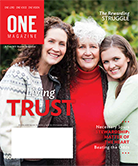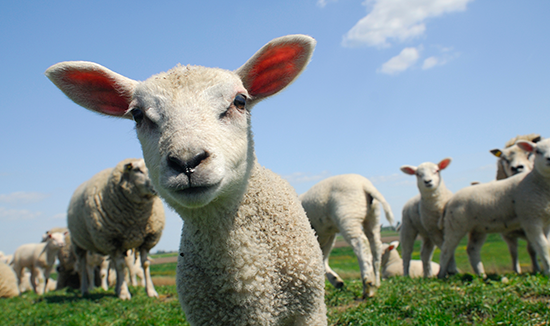
February-
March 2015
Living Trust
------------------
|

INTERSECT: Life Belongs to the Lord
Lessons from the redemption of the firstborn, Part 1
Exodus 13:11-16 What is life? Where does it come from?
Ultimately, these questions bring us face to face with the reality of our dependence upon the Creator. As we read in Genesis 2:7, God fashioned man from the dust of the ground, but man did not become a “living soul” until God breathed life into him. In that sense, all life originates from God. However, after sin entered into the world, man fell under the wrath of God and was condemned to die.
As Paul states it, “death reigned from Adam to Moses, even over those who had not sinned in the likeness of the offense of Adam, who is a type of Him who was to come” (Romans 5:14). The story of redemption is God’s plan to rescue humanity from the death sentence passed upon us. In the book of Exodus, we are introduced to the law of the firstborn.
The basis for this law is rooted in God’s redemptive act of bringing Israel out of Egyptian bondage, but more specifically, it is tied to the killing of the firstborn Egyptian males. What happened to the Egyptians demonstrated God’s ultimate authority over human life. He is just whether He gives life or takes it. In one sense, the Egyptians were already under the sentence of God’s wrath, and the killing of the firstborn was a painful demonstration of that reality. He took the lives of both firstborn male humans and livestock, demonstrating his sovereignty over all of life.
However, God also provided His covenant people with a means of redeeming, of saving their firstborn male children. Since many Egyptians also confessed Yahweh as covenant Lord, no doubt a number of them were spared as well. The redemption came about through the slaughter of the lamb, a substitute on behalf of the firstborn male of the family. This historical event provides the basis for the Feast of the Passover, which marks the moment when the angel of death “passed over” the Israelite homes where the blood of the redemption lamb had been applied to the door.
Practicing Redemption (verses 11-13)
The Passover was not simply intended to be a festival to commemorate the historical redemption of the Passover firstborn. It became a central practice in the life of the covenant community. In these verses, God instructed the people of Israel to practice the rite of the firstborn, returning it to God:
-
Every (first) breach of the womb belongs to Yahweh.
-
Every (first) breach of the male offspring of the beast, which belongs to you, belongs to Yahweh.
Life is filled with constant reminders of God’s law and justice in the world. Death is the ultimate reminder. No one can escape this fate. Yet, for covenant people, the condemned are being redeemed, and the redemption of the firstborn male is a regular remembrance of this point.
In other places in Scripture, the firstborn is referred to as the “beginning of strength” (Genesis 49:3). In this passage, it refers to the “opener or breach of the womb,” connecting the firstborn idea to both father and mother. The firstborn had a special role in the ancient Near East—to procure success and prosperity in the world.
The firstborn received significant status, both in this life and in the life to come. The firstborn male carried the responsibility of ensuring the family line and estate. He held economic and symbolic significance for the overall wellbeing of the family. This status carried over to livestock and agricultural produce. The firstborn or “first fruit” was the best, and the LORD told Israel it belonged to him and was to be given back to him sacrificially.
He made it clear that all things belong to the Lord, even the firstborn. This was painfully revealed to the Egyptians who refused to obey His command. This was also clear in the mandatory sacrifice of the firstborn animal of the flock and first fruits of the agricultural yield. These all belonged to God, and sacrificing them provided a constant reminder of His ownership.
This act was both costly and difficult. What if the animal never delivered another offspring? What if the next yield was not as plentiful? These sacrifices required trust on the part of the Israelites as they submitted themselves to the principle of the firstborn. As the life-giver (and thus the owner), God provides for the needs of his people. His people simply need to recognize His ownership and authority as Creator and allow their trust to carry over into daily financial behavior.
However, the firstborn principle did not refer only to what the Israelites owned in livestock or what they produced in agriculture; it was true of life itself. God did not sanction human sacrifice, a common practice in some sectors of the ancient world when devotees sought to secure the favor of their gods in a manipulative fashion. Instead, He established the redemption of the firstborn. He offered a means of substitution. This substitution was costly, but it communicated that God is both author and arbiter of human life.
Teaching Redemption (verses 14-16)
When we behave a certain way, it inevitably raises questions. In the case of the redemption of the firstborn, it raised questions for the children of Israelite families. When this rite was followed, it prompted children to ask, “What is this?” The scriptural answer pointed to God’s redemption story:
“By strength of hand the Lord brought us out from Egypt, from the house of bondage: And it came to pass, when Pharaoh would hardly let us go, that the Lord slew all the firstborn in the land of Egypt, both the firstborn of man, and the firstborn of beast: therefore I sacrifice to the Lord all that openeth the matrix, being males; but all the firstborn of my children I redeem” (verses 14b-15).
Passover served as a sign of God’s powerful deliverance of the people of God from the house of slavery in Egypt. It also served as an occasion to pass down the tradition of God’s redemption to generation after generation as a perpetual sign of God’s provision.
Redemption is costly. Life is at stake, and life is required for it to occur. Sacrifice has to be made for redemption to take place. This principle is the bedrock of our Faith. Every time we observe the elements of the Lord’s Supper, the new covenant Passover, it reminds us of the cost of our redemption. We belong to God, and we have violated His standard of holiness. Therefore, we are condemned to death and must be purchased (redeemed) from the bondage of sin and shame.
In the next issue of ONE Magazine, as we approach the Easter season, we will examine several New Testament passages that make it clear that Jesus is, indeed, our Passover lamb, whose life was given to buy the pardon for our lives of sin.
Intersect: where the Bible meets life is a regular column of ONE Magazine.
About the Writer: About the Writer: Matthew McAffee is coordinator of Theological Studies at Welch College. He earned a Bachelor of Arts degree at Welch College, Master’s degrees from Southern Baptist Theological Seminary and University of Chicago, and is currently pursuing his Ph.D. from University of Chicago.
|
|

